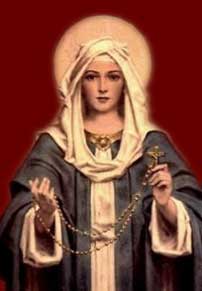 Readings: Mi 5,1-4; Ps 13, 6; Mt 1,18-23
Readings: Mi 5,1-4; Ps 13, 6; Mt 1,18-23Today we celebrate the birth of the Blessed Virgin, the Mother of God, Mary Most Holy, who was conceived without original sin in order to be able to carry God the Son, the Second Person of Most Holy Trinity in her womb, to be the privileged channel through whom God became man. Today’s Gospel makes clear Mary’s purpose as well as the crucial role she plays in God’s plan of salvation. We celebrate this feast less than a month after celebrating our Blessed Mother’s glorious assumption into heaven at the end of her life, which calls us to pray for the grace of a joyful death. To die joyfully is to die in the friendship of Christ, the Virgin Mary's son.
Mary’s conception without sin (i.e., Immaculate Conception) was dogmatically defined by Pope Pius IX in the Apostolic Constitution Ineffabilis Deus, promulgated on 8 December 1854. In essence the dogma, which must be believed with divine and Catholic faith, pronounces that the Blessed Virgin Mary "in the first instance of her conception, by a singular privilege and grace granted by God, in view of the merits of Jesus Christ the Saviour of the human race, was preserved exempt from all stain of original sin." This means that Mary was conceived by her parents, who, according to tradition are known as Joachim and Anna, in the normal way children are conceived, unlike Mary’s conception of Jesus by the Holy Spirit, which is also a unique and singular event. Her unique role in the economy of salvation is recognized in the role she plays in our Catholic worship and devotional life. First there is latria, which is worship due to God alone. Then there is dulia, or the veneration we give to the saints. In between these two is the category of hyper-dulia , which is exactly what it sounds like, super veneration. Alone in this category, between God and the saints, is our Blessed Mother, Mary.
It is important not to wax too romantic about Mary’s life and what her "Yes" to God meant for her in practical terms. Her lot was not without suffering, fear, and anxiety. Our Gospel this morning makes this very clear. We read in Matthew that Mary found herself “with child through the Holy Spirit.” Since she was with child prior to being married to Joseph and going to live with him, it is easy to see why Joseph initially reacted in the way he did, seeking to break off their betrothal until what had happened was made known to him by a divine messenger. While confident, no doubt, that God is trustworthy, it is difficult to imagine that Mary experienced uncertainty, anxiety, and even some fear about her predicament, especially about how it might appear to others. It is quite clear from this passage that the fact she was with child “through the Holy Spirit” was known only to Mary and Joseph. It is safe to assume that everybody else thought, as Mary became more visibly pregnant, the child she was carrying and gave birth to, was Joseph's child.
What does this mean for us poor banished children of Eve? As all mysteries of the faith it means many things. However, in basic terms, it means that by recognizing Mary’s crucial role in the economy of salvation, we also recognize her as a model for our own faith. It is no exaggeration to say that Mary was the first Christian due to her acknowledgement of Jesus, her Son, as the Messiah promised to and long awaited by Israel. Her magnificat clearly indicates this when she concludes her hymn of praise: “He has come to the help of His servant Israel, for he has remembered his promise of mercy. The promise he made to Abraham and his children forever.” Mary’s whole life was a “Yes” to God. She answered “Yes” to God without counting the cost, without worrying about the consequences because she trusted God, knowing that He is love and also knowing that God’s ways are not human ways. As followers of Jesus Christ we are called to do the same in all of the circumstances of our lives.
Secondly, now as then, Mary brings Jesus to us and us to Jesus. As Blessed Teresa of Calutta, also known as Mother Teresa, would say when asked by non-Catholic Christians about her devotion to Mary, “No Mary, no Jesus.” We can expand on this and say K-N-O-W Mary,
K-N-O-W Jesus. Therefore, we should trust in her intercession and call upon her often. For indeed she did a bear a son, just as the angel promised. Jesus Christ, the son of Mary, is Emmanuel; God with us. He is with us in no way more powerfully than in the Eucharist.
So, dear friends in Christ, pray the rosary today and, in observance of this Feast and in light of today's Gospel, despite the fact it is Friday, a day on which we usually meditate on the Sorrowful mysteries, contemplate the Joyful mysteries.


No comments:
Post a Comment